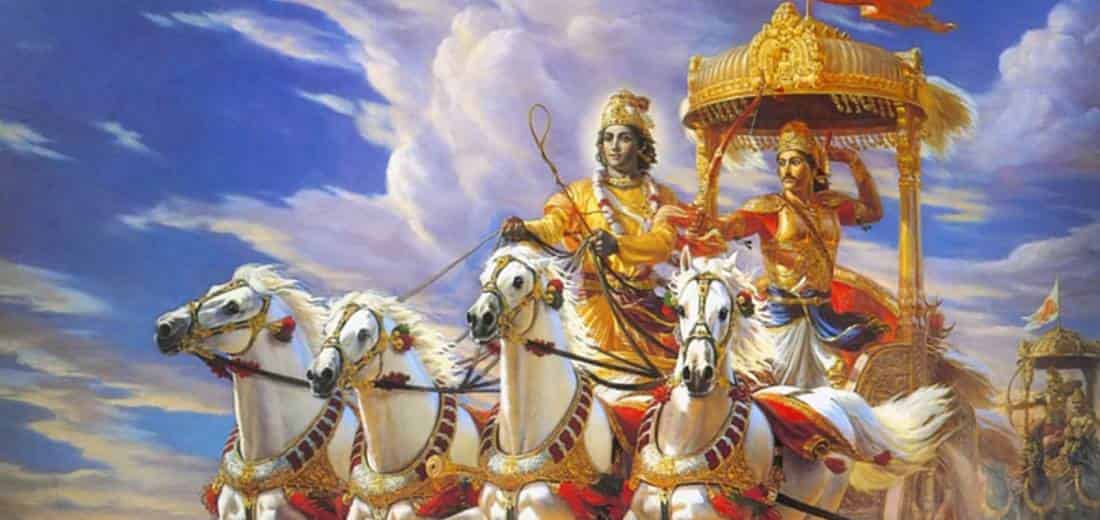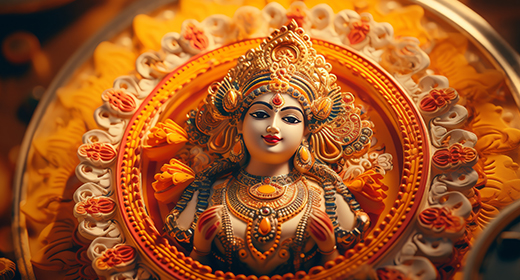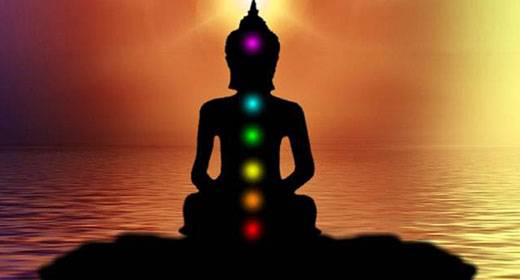SHLOKAS
नासतो विद्यते भावो नाभावो विद्यते सतः।
उभयोरपि दृष्टोऽन्तस्त्वनयोस्तत्त्वदर्शिभिः।।2.16।।nāsato vidyate bhāvo nābhāvo vidyate sataḥ
ubhayor api dṛṣṭo ’ntas tv anayos tattva-darśibhiḥ
There is no existence of unreal things and no cessation of real things. The truth and nature of both aspects are verily observed and concluded by the philosophers and seers of truth.
The world consists of two types of nature, Sat (Real) and Asat (Unreal). Sat will remain forever while Asat will vanish one day. Let us understand this through a few examples.
According to the Vedas, God is referred to as "sat-chit-anand" meaning "eternal full of knowledge and bliss". God is sat because he is existing eternally. He will be forever.
There is nothing in this world that can harm the soul. No weapon, No power, and No one. The soul is immortal. When the body dies, its existence ends but the soul remains forever. This also means that the body is asat (temporary).
What a Maya or Illusion is? Maya is sat; Why? What we see around us are material objects which will go into the process of cessation someday or other. These are asat or temporary which will get destroyed with time. Maya or illusion remains and it continues the process of building new material objects around us. That is why Maya is sat.
We are the part of sat and asat both and the cycle continues with the combination of both.
नैनं छिद्रन्ति शस्त्राणि नैनं दहति पावक: ।
न चैनं क्लेदयन्त्यापो न शोषयति मारुत ।।2.23।।nainaṃ chindanti śastrāṇi nainaṃ dahati pāvakaḥ
na cainaṃ kledayantyāpo na śoṣayati mārutaḥ
There is no weapon that has the power to cut the Atma (Soul) into pieces, nor can it be burned.
The soul cannot be affected by water nor withered by the wind.
Arjuna was upset over fighting with his relatives. He was not convinced to kill his cousins, and others even if they were wrong. Krishna explained to him that nothing can harm the soul, and no one can die even if the body gets destroyed.
The body is just the cloth of Atma (Soul). When one dies, it is the body that dies, that vanishes not the soul. The soul is immortal. It can never die. The weapon or outer aspects can only harm the body but there is nothing that can destroy the soul. Then why cry over death, this is nothing but the process of this artificial world. The soul is always around. No weapon has the power to harm it. There is nothing that can cut the soul that can burn the soul, that can drench the soul or that can wither the soul.
Likewise, human beings abandon a cloth and wear a new one, the same way, the soul abandons a body and takes the new body. The name is new, the people are new, the surroundings are new, the life is new but the soul is old. It is the same soul for which you cried, for which you anguish, what is the use of this now? If the soul is happy with a new body then why are you not?
Change is the core nature of an individual. Why do we die? We die to take rebirth. It is the cycle which we should accept.
हतो वा प्राप्स्यसि स्वर्गं जित्वा वा भोक्ष्यसे महीम्।
तस्मादुत्तिष्ठ कौन्तेय युद्धाय कृतनिश्चयः।।2.37।।hato vā prāpsyasi swargaṁ jitvā vā bhokṣhyase mahīm
tasmād uttiṣhṭha kaunteya yuddhāya kṛita-niśhchayaḥ
There is always two options when you fight; either you are slain and go to heaven or gain victory and enjoy life on earth.
So, O son of Kunti, get up and fight with determination.
Why quit? Why surrender before competing? Why get afraid of consequences? Everything has its way toward a new life. There is no point in taking back your steps. If you win that is definitely good but if you lose then there will surely be something good waiting for you. Every result comes up with something for you.
If you have taken a step ahead, if you are committed to something, then carry the dedication to complete the task irrespective of the result. In this Shloka, Krishna explains to Arjuna the importance of the Mahabharat Yudh (War of Mahabharata). Whether Arjuna wins or loses the war, the outcome will ultimately be for his well-being and that of the other Pandavas. Therefore, without overthinking, Arjuna should proceed with his war for truth.
The shloka is not only for Arjuna but for every living being who stopped their journey due to the fear of unfavorable results. Remember, no result is bad. Every result is the decision of God and the decision of God is always good and beneficial. Never doubt your actions; when you are on the path of truth and righteousness; then there is nothing that comes bad for you.
सुखदुःखे समे कृत्वा लाभालाभौ जयाजयौ।
ततो युद्धाय युज्यस्व नैवं पापमवाप्स्यसि।।2.38।।sukha-duḥkhe same kṛitvā lābhālābhau jayājayau
tato yuddhāya yujyasva naivaṁ pāpam avāpsyasi
Happiness or distress, loss or gain, Victory or Defeat should be put aside while in a fight or war. Fighting keeping all the thoughts and emotions aside will never let you incur sin.
After motivating Arjuna on a mundane level, Krishna now decided to motivate him deeper into the law of work. While fighting, Arjuna feared that he would incur sin by killing his own brothers (or enemies in Kurukshetra). He was surrounded by tons of emotions due to this. Krishna then explained to Arjuna to just do his duty without being attracted to its happenings. Such a type of dedication will release him from sinful results.
When we do something carrying selfish motives then we create karma, and karma will definitely bring positive or negative reactions. But when the work is done selflessly, then one should not be worried about karma. These types of actions are the decisions of God.
Let's take an example,
When a soldier kills a terrorist while safeguarding his country, then he is not committing a sin. It is the demand of the moment.
Killing a culprit convicted of a fatal crime is not a sin. It is a necessity.
If a terrorist or a culprit is not killed, they will harm innocent people. So, it is important to kill them.
This is what Krishna explained to Arjuna. Duryodhana and his brothers were not only the culprits in the case of Draupadi but also of mankind. They must be punished for their crimes; otherwise, no one would dare to stand against evil. So, O Son of Kunti, take a step forward and fight against injustice. This way you will set an example for the people.
कर्मण्येवाधिकारस्ते मा फलेषु कदाचन।
मा कर्मफलहेतुर्भूर्मा ते सङ्गोऽस्त्वकर्मणि।।2.47।।karmaṇy-evādhikāras te mā phaleṣhu kadāchana
mā karma-phala-hetur bhūr mā te saṅgo ’stvakarmaṇi
Do your work without carrying the greed for results or benefits of your actions.
So, don't do the work for results but keep doing it without carrying any hope or greed.
Work should be done for satisfaction, and not for benefits. If one performs an action out of desire for benefits, then even the good work goes in vain. Karma is your duty, not a competition where you will win and get an award. One must do one's prescribed duties. Whatever we do, whatever we did, whatever we will do is already decided by God itself. We are doing a good deed but it is God who chooses us to do that work. Then who are we take the credit and to expect the result in our favour. We should never stop doing our duty, we should never be inactive, instead, keep doing our duty without being attached to the beneficial result. One who does the work in the greed of the result is never loyal to even oneself.
God is the decider and God is the giver. It is the one who decides our duty and who gives the result. Good or bad, everything is in the hands of God. Work done for the result is binding, a boundation, a selfish job. With this even the good work becomes inauspicious.
That is why Krishna advised Arjuna to fight without being worried about the result. His inaction will be sinful so that is not an option to choose. Leave the attachment behind as it takes you away from salvation. Therefore, he should fight because this is his duty and an auspicious path.
ध्यायतो विषयान्पुंसः सङ्गस्तेषूपजायते।
सङ्गात्संजायते कामः कामात्क्रोधोऽभिजायते।।2.62।।dhyāyato viṣhayān puṁsaḥ saṅgas teṣhūpajāyate
saṅgāt sañjāyate kāmaḥ kāmāt krodho ’bhijāyate
Thinking repeatedly of an object or topic develops an attachment to that.
That attachment then leads to desire and anger arises from desires.
A day becomes miserable when we are not well. Even a little headache demands complete rest. Simply put, this means that when we are affected by an illness physically, then we are not in the condition to perform. But despite carrying mental issues, how can we expect to be all well.
Yes, the mental issues, or manas rog. Anger, greed, lust, these are the manas that we carry with us forever. We do not realize these diseases and this is the reason, we are not able to cure them and inadvertently, we are just making ourselves unwell. As almost every physical disease comes from mental issues.
We might think that we are not the victim of anger, greed and lust. But without our conscience, we are becoming prey to them. How? For example, you visit a shoe shop and are overwhelmed with a pair of shoes. What will happen next? You keep thinking of that pair continuously. Eventually, you get attached to it, you desire to get that pair in any condition. When the desire gets fulfilled, you will develop greed to get more. The greed then causes lust and lust lead to anger.
This not only applies to material objects but also to a person. When you get attached to a person, it also causes the same mental issues. Krishna explains the same to Arjuna and encouraged him to fight without carrying any attachment.
यदा यदा हि धर्मस्य ग्लानिर्भवति भारत।
अभ्युत्थानमधर्मस्य तदाऽऽत्मानं सृजाम्यहम्।।4.7।।yadā yadā hi dharmasya glānir bhavati bhārata
abhyutthānam adharmasya tadātmānaṁ sṛijāmyaham
Whenever Dharma (Righteousness) declines and Adharma (Unrighteousness) rises on this earth.
O Arjuna, I, Krishna will manifest myself on this earth.
Dharma (Righteousness) is the path set by God. It is our duty to follow the path of God, i.e. the path of Truth or Righteous. Dharma is a conducive situation for spiritual growth and wellness. The opposite of Dharma is Adharma. It is also known as Unrighteousness. When an individual prevails on the path of Adharma, then God interferes. Whenever unrighteousness increases on the earth, then to protect the world and every living being, God incarnated.
Since the beginning of the world, God has taken infinite Avatar (incarnation). So, remember, God will definitely punish someone moving onto the path of unrighteousness.
परित्राणाय साधूनां विनाशाय च दुष्कृताम्।
धर्मसंस्थापनार्थाय संभवामि युगे युगे।।4.8।।paritrāṇāya sādhūnāṁ vināśhāya cha duṣhkṛitām
dharma-sansthāpanārthāya sambhavāmi yuge yuge
For the welfare of righteous people, to annihilate bad people,
To re-establish Dharma, I will take rebirth on this earth, ages after ages.
In verse 4.7, Krishna states that he will incarnate on the earth ages after ages. In this shloka, he explains three reasons for taking incarnation which are as follows:
To protect Dharma: Dharma is the strongest pillar of the living. God always supports those who are on the path of righteousness or truth.
To Demolish Adharma - Whenever iniquity starts increasing, whenever wicked people start ruling, then God takes an Avatar to annihilate the adharma.
To re-establish Dharma - God has the power to establish dharma again on the earth. Dharma is mentioned in Vedas and so it is necessary for a true life.
श्रद्धावाँल्लभते ज्ञानं तत्परः संयतेन्द्रियः।
ज्ञानं लब्ध्वा परां शान्तिमचिरेणाधिगच्छति।।4.39।।śhraddhāvān labhate jñānaṁ tat-paraḥ sanyatendriyaḥ
jñānaṁ labdhvā parāṁ śhāntim achireṇādhigachchhati
With deep and dedicated faith, one can control one's mind and senses and eventually attain divine knowledge.
With this transcendental knowledge, everlasting supreme and divine peace can be quickly attained.
Krishna explains to Arjuna the way to attain transcendental knowledge and its benefits. He explains it in the context of faith. Those having deep faith know to control the mind and senses. It then leads to the power of attaining divine knowledge. This power of control is known as transcendental knowledge. The knowledge leads to the utmost peace.
Faith is the power, it also helps us to distinguish between the right and the wrong. It is a type of confidence that one builds. When faith is laid by someone with the wrong intention then it creates disaster but when someone with true intentions builds faith, it opens the way to eternal bliss and knowledge.
However, blind faith is not correct. One should keep one's intellect open while having faith. This is the finest way towards truth.
Krishna explains to Arjuna the way to attain transcendental knowledge and its benefits. He explains it in the context of faith. Those having deep faith know to control the mind and senses. It then leads to the power of attaining divine knowledge. This power of control is known as transcendental knowledge. The knowledge leads to the utmost peace.
Faith is the power, it also helps us to distinguish between the right and the wrong. It is a type of confidence that one builds. When faith is laid by someone with the wrong intention then it creates disaster but when someone with true intentions builds faith, it opens the way to eternal bliss and knowledge.
However, blind faith is not correct. One should keep one's intellect open while having faith. This is the finest way towards truth.
With the power of the mind, elevate yourself rather than degrade yourself,
It is the mind which can be the friend and also the enemy of an individual.
Do you know who our true friend is? Do you know who our biggest enemy is? The interesting part is that the answers to both the questions are the same. We are the greatest friend and the biggest enemy of ourselves.
The human body is made up of bones, muscles, veins, blood vessels, and more. These are scientific interpretations. In spiritual interpretation, we are made up of ego, desires, attachments, thoughts, perception, and so on. All these decide our good and our bad. That is, we decide our mood and our happiness.
No matter how bad the situation is, if we are positive about it, then we can tackle it. In the same way, no matter how good the situation is, if we are negative about it, then we can never remain happy. We should avoid the emotions like greed, lust, ego, anger, negativity, and all those that cause stress. We should adopt the emotions like happiness, joy, positivity, and so on.
यस्मान्नोद्विजते लोको लोकान्नोद्विजते च यः।
हर्षामर्षभयोद्वेगैर्मुक्तो यः स च मे प्रियः।।12.15।।yasmān nodvijate loko lokān nodvijate cha yaḥ
harṣhāmarṣha-bhayodvegair mukto yaḥ sa cha me priyaḥ
Those who are not annoyed by anyone and do not get agitated by anyone,
Those who are equal in happiness and pain, and fear from anxiety and fear, are dear to me.
The soul is pure and spiritual. It never leads to any wrongdoings. It is the mind that is impure. When the impurities from the mind remove, then the soul also flourished. How do remove these impurities? Devotion is the answer. It is a powerful cure to all our problems.
Devotion softens our heart and eventually make us gentle in dealing with situations. Besides, it makes us understand that God is present even in every tiny fragment. Therefore, with this, one cannot think of harming anyone.
Devotion brings the confidence to fight even the toughest situation. It lets us assume even the negative environment is in our favour. So, the power of it doesn't let us agitate.
Devotees are equipped with one emotion only, that is, the emotion of devotion. Whether the situation is friendly or adverse, a devotee holds the same emotion. He is equal in pleasure and pain.
The safest place lies in the devotion of God. It doesn't create any type of fear or anxiety. It helps us detach from material objects, and when we are able to do this, we are free from fear.
FAQ's
Frequesntly Asked Questions About Bhagavad Geeta:
Q1 - Which is the most powerful Krishna shlok of Bhagavad Gita?
Ans: Some of the most powerful and practical shloks spoken by Lord Krishna in the Bhagavad Gita are:
- यदा यदा हि धर्मस्य ग्लानिर्भवति भारत। अभ्युत्थानम् अधर्मस्य तदात्मानं सृजाम्यहम्।।
- कर्मण्येवाधिकारस्ते मा फलेषु कदाचन। मा कर्मफलहेतुर्भूर्मा ते सङ्गोऽस्त्वकर्मणि।
Q2 - Is Bhagavad Gita a book related only to war or religion?
Ans: No, the Bhagavad Gita is not limited to war or religion. The war of Mahabharata is only the setting. In reality, the Gita is a guide to life that teaches karma (duty), righteousness, self-control, and inner peace. Its teachings are practical and applicable to everyday life, helping individuals deal with confusion, fear, and challenges.





